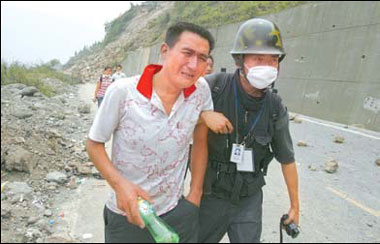One man's walk against the odds
By Hu Yinan (China Daily)
Updated: 2008-05-19 09:36
Updated: 2008-05-19 09:36
YINGXIU, Sichuan - Tashi was born with a biological deformity in his leg. But he walks faster than most people, even on the mountain roads to Yingxiu, damaged in the May 12 earthquake.
 China Daily reporter Hu Yinan (Right) helps Tashi on his way to Yingxiu in Wenchuan County on Sunday. Tashi, a Tibetan, was desperate to reach Wenchuan to save his relatives, and decided to walk because no transport was available. [China Daily] |
The ethnic Tibetan is a native of Aba in Sichuan province, which was devastated by the quake, and works in the nearby city of Dujiangyan.
He has to reach Wenchuan, he said. Why? "To save my family."
To get to Wenchuan, however, he had to reach Yingxiu first, the first town on way to the epicenter of the quake for outsiders. For that he could take a helicopter, a rubber boat or a car - or walk.
Given the condition of Wenchuan and its surrounding areas, the first three modes of transport were safely ruled out. No helicopter would fly in the dense haze across the mountains, rubber boats could only be used to ferry rescuers and medical personnel to the interiors, and carry quake survivors back. And since the only bridge connecting Yingxiu to the outside world has collapsed, no vehicle can drive to Wenchuan.
That left Tashi with just the last option, and that's precisely what he chose on Saturday. He began walking, and was half way to Wenchuan in six hours.
A young police officer advised Tashi not to venture toward Wenchuan on foot. "You won't make it," he warned. "Four civilians died the other day trying to walk out of Yingxiu. Take a look below, will you?" Tashi looked down from the precipitous cliff they were standing on. He could see the Min River thundering through the gorge. He didn't say anything.
An hour later, he reached Yingxiu.
The quake has almost wiped out Yingxiu. Parts of only a few buildings such as the Xuankou Middle School and a factory stand in the new town area. Apart from two dogs, reluctant not to leave the land of their by-now dead masters, there's no trace of life on the southern side of the river, where the old town used to be.
Yingxiu looks like a battlefield, complete with divisional headquarters, helicopter aprons, rescue operation centers of all scales and tents for PLA soldiers, armed police, firefighters, medical teams and volunteers from all parts of the country. Most of them stay in and around what remains of the middle school. About 100-odd survivors have taken shelter on the eastern side of the school.
Though survivors and much of the rescue and relief teams can still get food and water, essentials are in short supply throughout the area. This despite about a dozen helicopters carrying a consignment of goods after the skies cleared up around 3:20 pm on Saturday.
The rescue team has benefited from more than 20 volunteers from different provinces. The volunteers move from one place to another throughout the day, trekking through the mountains with medicines and other essentials.
Liu Jianping, 46, is one of them. He flew from Fujian province on Tuesday, and has already made four trips between Dujiangyan and Yingxiu. "It's easy to walk through what remains of Yingxiu, but it's hard to get there," he said. "That's why I'm here." He was carrying 10 kg of medicines on his back.
About 10 survivors stopped Liu in the upper reaches of the Min River while he was checking the Yingxiu-Wenchuan road for safety to ask him if he was coming from Wenchuan. All of them were determined to reach the city to look for their families.
"No you can't," Liu pleaded with every one of them. "Those who survived the quake have been shifted to Dujiangyan. Please go there and check ... Our soldiers are on their way to Wenchuan to look for more survivors. But it's too dangerous for you to try to do the same."
As many as 1,000 civilians, though, did manage to reach Yingxiu from other townships of Wenchuan on Saturday evening after walking for 30 hours through narrow cliffs and hazardous roads.
Everyone in Yingxiu has been advised to (and many do) wear helmets and masks. But "things will be more complicated from now on", says a doctor with the Southern Medical University. "If it rains heavily a couple of more times, corpses in the mountain townships, where rescuers have been unable to reach, will flow down the streams and rivers. The rotten bodies will contaminate the Min River, which flows into the Yangtze River. That could become a major health hazard.
"But hopefully, our soldiers will get there before that happens."
|
||
|
||
|
|
|
|
